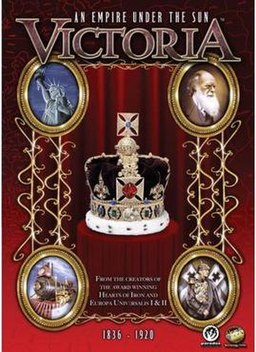Victoria (video game)
| Victoria: An Empire Under the Sun | |
|---|---|
 |
|
| Developer(s) | Paradox Interactive |
| Producer(s) | Johan Andersson |
| Designer(s) | Joakim Bergqwist |
| Programmer(s) | Johan Andersson |
| Artist(s) | Dick Sjöström |
| Platform(s) | Microsoft Windows, Mac OS X |
| Release | November 2003 |
| Genre(s) | Grand strategy |
| Mode(s) | Single player |
| Aggregate score | |
|---|---|
| Aggregator | Score |
| Metacritic | (PC) 58/100 |
| Review score | |
| Publication | Score |
| GameSpot | 6.3/10 |
Victoria: An Empire Under the Sun is a grand strategy game by Paradox Entertainment (now known as Paradox Interactive), released in 2003. It covers primarily its namesake the Victorian period (1837-1901) and beyond, specifically 1836-1920 for the main game, and extended until 1936 if the expansion is installed. The game runs on a modified version of the Europa Universalis engine, and the lead game programmer was Johan Andersson. It was later ported to Macintosh by Virtual Programming.
Unlike previous Paradox Games, which either focused on diplomacy (Europa Universalis) or war (Hearts of Iron), Victoria focuses on internal management, covering the industrialization and social/political changes in a country. The game itself gives a lot of importance to the economy of a country, having a complex market system which is described as being one of the best economic simulators ever made. Fans of Paradox's games have noted this one for being the deepest game Paradox had yet made, making it quite popular with the Paradox fanbase. However, Victoria received largely indifferent reviews on release, averaging only 60.4% on GameRankings. Critics cited reasons such as the game's steep learning curve and its relatively dated graphics.
On August 19, 2009, Victoria II was announced, and was released on August 13, 2010.
The main goal is to end the game with most Victory Points. To get victory points, the player must score in three categories:
The combined score of the above three categories determines the "winner" of the game.
The economic system in Victoria attempts to simulate the flow of resources in a world market. Every province in the game produces a resource. Some resources, such as wheat, are demanded principally by POPs (population units), and can be sold directly. Other materials, such as timber, are consumed mostly by industry - but can nonetheless be sold directly for less profit. The player possesses a wide range of options with which to build their economy, provided they have access to the proper raw materials. All resources can be collected or produced by industry. They can also be acquired on the world market. Access to the world market is granted based on a country's prestige rating.
...
Wikipedia
